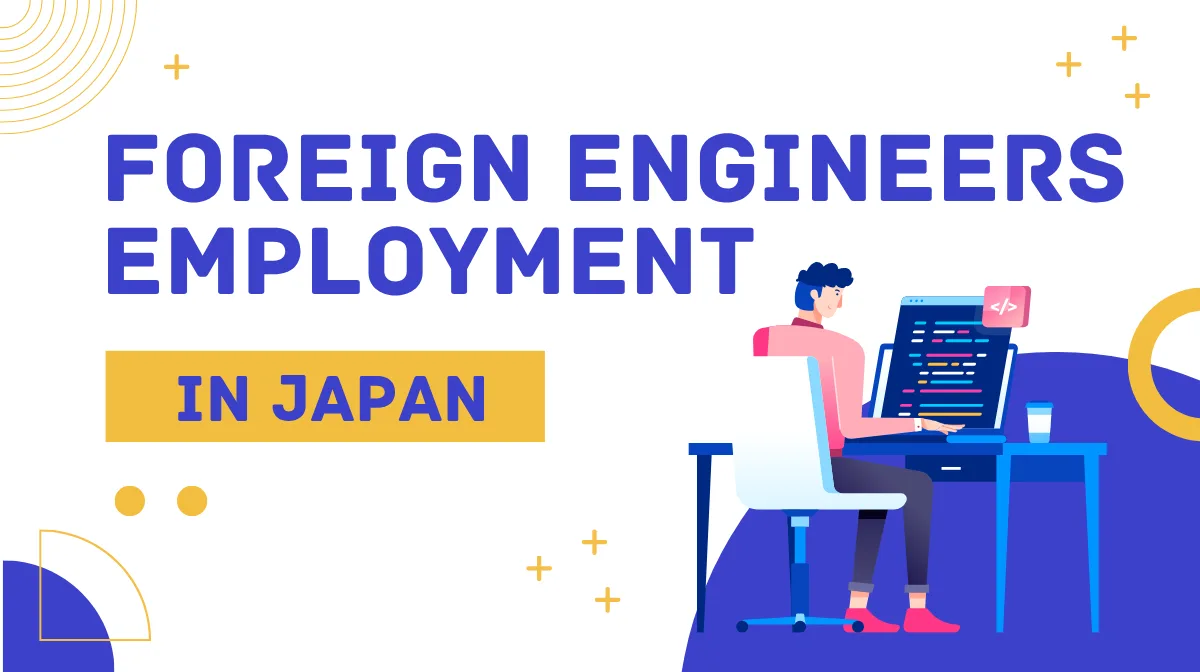Against the backdrop of a severe talent shortage in Japan’s IT industry, demand for foreign engineers is rapidly increasing.
With predictions that Japan will face a shortage of up to 790,000 IT professionals by 2030, the country presents tremendous opportunities for foreign engineers.
However, many challenges exist, including visa acquisition, language barriers, and cultural differences.
This article provides a detailed explanation of the steps foreign engineers need to take to succeed in Japan.
1. Benefits and Market Trends for Foreign Engineers Working in Japan

Japan’s IT industry talent shortage presents a significant opportunity for foreign engineers.
As Japanese companies advance their globalization efforts, they highly value the diverse perspectives and specialized skills of foreign engineers, expanding their recruitment efforts accordingly.
Expanding Demand and Future Prospects for Foreign Engineers
According to Ministry of Health, Labour and Welfare statistics, the number of foreign workers with professional and technical status of residence has tripled over the past 10 years.
Particularly during the four-year period from 2018 to 2021, the number increased by approximately 120,000, with growth accelerating in recent years.
With Japan’s DX (Digital Transformation) initiatives, demand for foreign engineers skilled in cutting-edge technologies such as AI, cloud computing, and cybersecurity will continue to grow.
Reference: Ministry of Health, Labour and Welfare, Trade and Industry
Average Salary and Benefits for Foreign Engineers
The average salary for foreign engineers working in Japan can be considered equivalent to that of Japanese engineers.
Salaries vary significantly based on skills, experience, and Japanese language proficiency. Just like Japanese engineers, compensation changes based on technical expertise and skills.
Salary Range Examples for Foreign Engineers
- New graduates/1-2 years experience (N3 level): ¥3.5-4.5 million
- Mid-level (3-5 years experience/N2 level): ¥4.5-6 million
- Veteran (5+ years experience/N1 level): ¥6-12+ million
Engineers with high expertise and Japanese language proficiency can potentially earn over ¥10 million annually.
An increasing number of companies offer flexible work arrangements such as remote work, creating a more comfortable work environment for foreign engineers who value work-life balance.
Career Paths for Foreign Engineers Thriving in Japan
Foreign engineers working in Japan have access to diverse career paths.
Common career progression routes include:
Technical Specialist Career Examples
- Programmer → Senior Programmer → Tech Lead → Architect
- System Engineer → Senior SE → IT Architect → CTO
Management Career Examples
- Engineer → Project Leader → Project Manager → IT Department Manager
Independent Career Examples
- Corporate Engineer → Freelance Engineer → IT Entrepreneur
In recent years, examples of foreign engineers advancing to leadership positions have increased. Many leverage their bilingual skills to serve as bridge roles in global teams.
As a route for enhancing expertise, careers specializing in specific fields such as AI engineer, data scientist, or cloud architect are also popular.
2. Visas Required for Foreign Engineers Working in Japan

To work as a foreign engineer in Japan, obtaining the appropriate status of residence (visa) is essential.
Understanding visa types and acquisition requirements, and making optimal choices for your career plan, leads to long-term success in Japan.
“Engineer/Specialist in Humanities/International Services” Visa Requirements and Procedures
“Engineer/Specialist in Humanities/International Services” is the most common status of residence for foreign engineers working in Japan.
This visa applies to foreign professionals engaged in technical fields such as IT engineers, programmers, and system engineers.
The acquisition requirements are as follows…
Educational Requirements
- Graduation from a university or vocational school with a major in a related field
- OR 10+ years of practical experience (if lacking academic credentials)
Job Requirements
- Engagement in work requiring technical knowledge in natural sciences
- Work related to the studied specialization
Salary Requirements
- Compensation equal to or higher than Japanese workers (generally ¥3 million+ annually as a guideline)
Application Process Flow
- Application for Certificate of Eligibility by employing company
- Obtaining the certificate (review period typically 1-3 months)
- Visa application at Japanese consulate abroad
- Entry to Japan after visa acquisition
The validity period for this visa is typically 1 or 3 years for initial applications, but can be extended up to 5 years upon renewal based on track record.
Reference: Immigration Services Agency: Engineer/Specialist in Humanities/International Services
Benefits and Application Strategy for Highly Skilled Professional Visa
The Highly Skilled Professional visa is a status of residence established to favor foreign professionals with advanced technical knowledge and skills, offering more benefits than standard visas.
◇Main Benefits of Highly Skilled Professional Visa
- Maximum 5-year residence period (Highly Skilled Professional 1) or indefinite (Highly Skilled Professional 2)
- Permission for multiple activities (e.g., side jobs allowed)
- Ability to bring domestic helpers under certain conditions
- Relaxed employment restrictions for spouses
- Relaxed requirements for permanent residence application (eligible after 3+ years with Highly Skilled Professional 1)
The Highly Skilled Professional visa adopts a “points system” where points are calculated based on education, work experience, annual income, and other criteria. A total of 70+ points qualifies for application eligibility.
◆Application Strategy Points for Engineers
- Income maximization: Annual income significantly affects points
- Acquiring professional qualifications: Certifications like Information Technology Engineer Examination are eligible for additional points
- Improving Japanese language skills: Aim for JLPT N1/N2 acquisition
- Building research achievements: Paper publications and patent acquisitions are subject to point additions
Reference: Immigration Services Agency: Highly Skilled Professional
Transition Process from International Student to Foreign Engineer
Studying abroad in Japan serves as an effective step toward a career as a foreign engineer. The transition from student to work visa is relatively smooth, and many companies actively recruit international students.
◆Steps from International Student to Engineer
- Major selection
Choose IT/Computer Science departments or faculties - Internship experience
Gain internship experience at Japanese companies while enrolled - Japanese language improvement
Aim for business-level Japanese proficiency (N2+) - Job hunting
Search for companies actively recruiting international students and foreign talent - “Designated Activities” visa utilization
Up to 1 year of job-hunting period allowed after graduation - Status of residence change application
After receiving job offer, apply to change from “Student” to “Engineer/Specialist in Humanities/International Services”
◆Points Where International Students Have Advantages in Job Hunting
- Understanding and adaptability to Japanese culture already demonstrated
- Ability to leverage bilingual skills in Japanese and native language
- Specialized knowledge learned through Japan’s educational system
Reference: Immigration Services Agency: International Student Employment
Advantages of Spouse Visa/Permanent Resident Career Changes to IT Industry
Foreign nationals with Japanese spouse visas (Spouse or Child of Japanese National) or permanent resident status have various advantages when changing careers to the IT industry.
◇Main Advantages of Spouse Visa/Permanent Residents
- No employment restrictions: Free to work in any occupation
- Stable residence period: “Spouse or Child of Japanese National” 1-5 years, permanent residents indefinite
- Freedom of activities: Multiple jobs and side businesses possible
- Freedom to change jobs: Can change jobs without visa concerns
- Ease of entrepreneurship: Relatively easy to start own business
◇Specific Advantages for IT Industry Career Changes
- No requirement for field-related qualifications: Can work as IT engineer regardless of educational background or major
- Easy career starts from inexperience: Career changes using programming schools possible
- Freelance options: Can work independently as freelance engineer
Note that spouse visas require continuation of marriage, so status of residence changes become necessary in case of divorce.
Reference: Immigration Services Agency: Spouse or Child of Japanese National
■日本でエンジニアとしてキャリアアップしたい方へ
海外エンジニア転職支援サービス『 Bloomtech Career 』にご相談ください。「英語OK」「ビザサポートあり」「高年収企業」など、外国人エンジニア向けの求人を多数掲載。専任のキャリアアドバイザーが、あなたのスキル・希望に合った最適な日本企業をご紹介します。
▼簡単・無料!30秒で登録完了!まずはお気軽にご連絡ください!
Bloomtech Careerに無料相談してみる
3. Five Essential Skills Japanese Companies Seek in Foreign Engineers

When Japanese companies hire foreign engineers, they consider not only technical skills but also communication abilities and cultural adaptability.
Understanding and consciously improving these abilities can increase success rates for employment and career changes in Japan.
Practical Programming Skills (3+ Years Experience Standard)
Japanese companies seek practical programming skills that enable foreign engineers to become immediate assets after joining.
Given the severe IT talent shortage in Japan, companies with capacity to provide basic education are limited, and candidates with a certain level of technical competency tend to be prioritized for hiring.
For those aiming for engineer employment from inexperience, typical approaches include applying for new graduate recruitment at IT companies or gaining 1-3 years of practical experience in their home country before pursuing career changes to Japanese companies.
◇Required Technical Skill Level Examples
- Programming experience: Approximately 3 years as guideline
- Practical project experience: Participation in at least 1-2 development projects
- Coding ability: Level capable of independently building applications or systems
- Self-resolution capability: Ability to investigate and resolve problems independently
◆Popular Programming Languages and Skill Examples
- Web development: JavaScript, TypeScript, React, Vue.js
- Backend development: Java, PHP, Python, Ruby, Node.js
- Mobile development: Swift, Kotlin, React Native
- Infrastructure/Cloud: AWS, Azure, Docker
- AI/Machine Learning: Python, TensorFlow, PyTorch
Japanese Communication Skills Required for Work
For foreign engineers, Japanese language proficiency serves as an important hiring criterion alongside technical competency.
Particularly in Japanese companies, team collaboration and customer communication are frequent, and without a certain level of Japanese proficiency, work may be hindered in some cases.
However, even if Japanese proficiency is not perfect, many companies often evaluate positively when candidates demonstrate proactive communication attitudes and continuous learning motivation.
Recently, companies adopting English as their internal common language have also increased, providing options for those less confident in Japanese to target such companies.
◇Japanese Level Examples Required by Job Type
- Development engineers (backend, etc.): JLPT N3-N2 level
- Frontend/UI/UX engineers: JLPT N2+ level
- Project managers/leaders: JLPT N1 level
- Positions requiring customer negotiation: Business-level Japanese (N1 equivalent)
◇Particularly Important Japanese Communication Skill Examples
- Understanding and use of technical terminology: Master Japanese expressions of IT technical terms
- Meeting communication: Ability to express opinions in team meetings and daily scrums
- Document creation ability: Can create basic business emails and reports
- Phone correspondence: Can handle basic telephone interactions
Reference: Japanese Language Proficiency Test JLPT: Certification Guidelines
English Skills Valuable in Global Environments
As Japanese companies’ internationalization advances, with English becoming internal common languages and increasing interactions with overseas customers and overseas offices, the value of foreign engineers with English skills is rising.
Particularly “trilingual” talent who can speak Japanese and English in addition to their native language are valued in global projects.
◇Situations Where English Skills Are Particularly Valued
- Development projects at global companies
- Technical negotiations with overseas vendors
- Understanding and creating English documentation and API specifications
- Participation in international conferences and webinars
- Collaboration in international teams within companies
Many Japanese companies have recently accelerated global expansion, with increasing projects requiring overseas collaboration.
In such environments, foreign engineers are expected to serve as “bridge SEs” who facilitate smooth communication between Japanese staff and overseas staff.
Sensitivity to IT Trends and Continuous Learning Attitude
The IT industry evolves very rapidly, with new technologies, tools, and frameworks constantly emerging.
Therefore, foreign engineers are strongly required to have sensitivity to the latest IT trends and attitudes toward continuous learning.
◆Required Learning Attitudes
- Self-improvement motivation: Attitude toward learning new technologies outside work hours
- Trend sensitivity: Interest and understanding of new technologies and market trends
- Adaptability: Flexible response to new development methods and tools
- Problem-solving ability: Capability to explore solutions for unknown problems
According to surveys by Japanese companies, foreign engineers tend to have higher learning motivation compared to Japanese engineers.
Many foreign engineers are highly evaluated for their consciousness toward skill improvement, such as studying after work or participating in IT events on weekends to gather the latest information.
Adaptability to Japanese Business Culture
For foreign engineers to thrive long-term in Japanese companies, the ability to understand and adapt to Japan’s unique business culture and work styles is essential.
Skills are required to minimize misunderstandings and friction arising from cultural differences and work smoothly as team members.
◇Japanese Business Culture to Understand
- “Horenso” (report, contact, consult) habits
- Emphasis on teamwork and cooperation
- Implicit understanding and perceptive culture
- Decision-making process emphasizing consensus building (ringi system, etc.)
- Hierarchical relationships and proper use of honorific language
- Strict attitude toward time and deadlines
◇Effective Adaptation Strategies for Foreign Engineers
- Active questioning and confirmation: Ask questions on the spot to clarify unclear points
- Observation and learning: Carefully observe behavioral patterns of surrounding Japanese colleagues
- Utilizing mentorship systems: Find internal mentors who can teach Japanese culture
- Accepting feedback: Humbly accept advice about Japanese expressions and behaviors
Cultural adaptation takes time, but the diverse perspectives and cultural backgrounds that foreign engineers possess bring great value in providing new ideas and solutions to teams.
4. Three Routes for Foreign Engineers to Join Japanese Companies

Foreign engineers hoping to find employment with Japanese companies have multiple effective routes available.
It’s important to select the optimal method based on your situation and career goals.
New Graduate Recruitment Job Hunting Strategy
Japan’s new graduate recruitment system serves as an effective entry point for foreign students into Japanese companies.
Particularly for students studying at Japanese universities or vocational schools, this system allows them to conduct job hunting through the same process as Japanese students.
◇Main Benefits of New Graduate Recruitment
- Possible to be hired without practical work experience
- Comprehensive education and training systems after joining
- Clear long-term career paths
- Smooth visa acquisition (seamless connection between university graduation and employment)
Effective Job Hunting Steps
Early preparation (from fall of 3rd year university/1st year master’s)
- Registration with job information sites (Rikunavi, Mynavi, etc.)
- Research companies and narrow down target industries
- Receive Japanese proofreading for entry sheets
Event participation (3rd-4th year)
- Participation in joint company information sessions
- Participation in job fairs for foreign international students
- Consultation at university career centers
Selection preparation
- Practice Japanese interviews
- Prepare for group discussions
- Organize knowledge for technical interviews
As a particularly important point for new graduate recruitment, Japan’s job hunting has unique schedules and customs.
Typically, company information sessions begin around March of the 3rd year, with the peak selection period lasting until around June of the 4th year.
Career Change Strategy Using Specialized Agents
For foreign engineers who already have practical experience, career changes utilizing specialized agents provide an efficient route.
Human resource agencies specializing in foreign engineers provide strong support by addressing challenges unique to foreign talent, such as language support and status of residence procedures.
◆Benefits of Using Specialized Agents
- Can receive support even with Japanese language concerns
- Introduction to non-public job openings from companies actively recruiting foreign talent
- Support for visa application procedures
- Salary negotiation and condition adjustment representation
Effective Agent Utilization Methods
◆Selecting appropriate agents
- Agents specializing in foreign engineers (G Talent, Jellyfish, etc.)
- IT industry-specialized agents (Levtech Career, Mynavi IT AGENT, etc.)
- Major agents with global expansion (Robert Walters, Michael Page, etc.)
◆Self-analysis and clarification of desired conditions
- Inventory of skill sets and experience
- Organization of desired job type, industry, work location, salary conditions
- Confirmation of constraints such as visa status and Japanese language level
Career changes through specialized agents provide access not only to job information but also valuable insights about the latest information on Japan’s labor market, salary standards, and required skill sets.
Internship to Full-time Employee Route
Internships serve as a highly effective route toward full-time employment.
Particularly for those with Japanese language concerns or lacking work experience in Japan, first gaining practical experience at Japanese companies through internships can open paths to full-time employment.
◇Benefits of Internship to Full-time Employment
- Can understand company culture and job content through actual work
- Companies can reduce hiring risks, lowering employment barriers
- Provides opportunities to demonstrate practical skills and communication abilities
- Offers chances to prove capabilities even with developing Japanese language skills
Steps from Internship to Full-time Employment
Finding internships
- University career centers or international exchange departments
- Websites specializing in internships for foreign talent (Kopas, Internship in Japan)
- Direct approach to companies using LinkedIn and other SNS
Success strategies during internship period
- Demonstrate proactive attitude and contribution motivation
- Active learning of Japanese language and culture
- Build good relationships with team members
- Show skills and abilities through concrete results
Transition points to full-time employment
- Clearly communicate hiring intentions to supervisors or HR personnel
- Visualize and present achievements during internship period
- Explain long-term value you can bring to the company
Particularly noteworthy programs include internship programs for foreign talent provided by the Japanese government and local governments.
Recently, remote internships have also increased, making it possible to gain practical experience at Japanese companies while remaining in home countries.
Reference: Ministry of Health, Labour and Welfare
■日本でエンジニアとしてキャリアアップしたい方へ
海外エンジニア転職支援サービス『 Bloomtech Career 』にご相談ください。「英語OK」「ビザサポートあり」「高年収企業」など、外国人エンジニア向けの求人を多数掲載。専任のキャリアアドバイザーが、あなたのスキル・希望に合った最適な日本企業をご紹介します。
▼簡単・無料!30秒で登録完了!まずはお気軽にご連絡ください!
Bloomtech Careerに無料相談してみる
5. Job Types Where Foreign Engineers Can Excel in Japan

Japan’s IT industry offers diverse job types where foreign engineers can excel. Each job type has unique characteristics with different required skill sets and aptitudes.
Choosing job types that match your strengths and interests increases the likelihood of career success in Japan.
System Engineer (Balance of Technology and Language Skills is Key)
System Engineers (SE) are responsible for listening to client requirements and handling everything from system design to development, testing, and operation.
In Japanese companies, this role emphasizes communication skills alongside technical competency, making the balance of technology and language skills the key to success for foreign engineers.
Main Duties of System Engineers
- Requirements definition and system design
- Project management
- System development and testing
- Client negotiations
- Team management
Skill Examples Required for Foreign Engineers
- Technical skills: Programming languages like Java, PHP, C#; database design; infrastructure knowledge
- Japanese proficiency: N2+ level (N1 preferable for client negotiations)
- Business skills: Project management, communication abilities
- Problem-solving abilities: Troubleshooting, risk management
System Engineer salary ranges from ¥4-10+ million. At foreign companies and major IT firms, demand is growing for foreign SEs who combine high communication skills with technical expertise.
Programmer (Job Type That Maximizes Technical Skills)
Programmers handle actual coding based on system engineer designs.
With relatively infrequent Japanese communication requirements and emphasis on technical skills, this job type is relatively accessible for foreign engineers with Japanese language concerns.
Main Duties of Programmers
- Coding based on design documents
- Unit testing and debugging
- Code reviews and refactoring
- Program and module maintenance
Skill Examples Required for Foreign Engineers
- Technical skills: Various programming languages (JavaScript, Python, Java, etc.), frameworks
- Coding quality: Ability to create readable, maintainable code
- Basic Japanese ability: For team communication (N3+ level)
- Technical English: Level capable of reading and writing English documentation and comments
Programmer salary ranges from ¥3.5-7+ million. Programmers with skills in new technology areas (AI, blockchain, cloud, etc.) tend to earn higher compensation.
Technical Support (Multilingual Skills Become Weapons)
Technical support provides technical assistance to product or service users.
For foreign engineers, this job type leverages multilingual skills in native language, Japanese, and English, with particularly high demand at Japanese companies with global expansion.
Main Duties of Technical Support
- Responding to technical inquiries from users
- Troubleshooting and bug reporting
- Creating and updating manuals and FAQs
- Providing feedback to development teams
- Conducting user training
Skill Examples Required for Foreign Engineers
- Technical knowledge: Understanding of supported products and services
- Multilingual abilities: Multiple language skills including native language + Japanese + English
- Communication skills: Clear explanation and problem-solving abilities
- Customer service skills: Patience, empathy, problem-solving orientation
Technical support salary ranges from ¥4-6+ million. Global support personnel handling multilingual correspondence tend to earn higher compensation.
IT Consultant (Senior Position with High Income Potential)
IT consultants are senior professionals responsible for corporate IT strategy formulation, system selection, and implementation support.
Requiring advanced technical knowledge, business knowledge, and communication skills, this position offers high income potential for experienced foreign engineers.
Main Duties of IT Consultants
- Analysis of client company IT challenges
- IT strategy and roadmap formulation
- System selection and vendor selection support
- Project oversight and PMO
- Technology trend research and proposals
Skills Required for Foreign Engineers
- Technical knowledge: Broad IT domain knowledge (cloud, security, AI, DX, etc.)
- Business skills: Management strategy, industry knowledge, cost analysis
- Advanced Japanese proficiency: N1+ level (business negotiations, presentations)
- Problem-solving abilities: Analysis of complex issues and solution presentation
- Presentation skills: Proposal and persuasion abilities
IT consultant salary ranges from ¥7-12+ million, representing high compensation levels. Particularly at foreign consulting firms, even higher compensation can be expected.
6. Challenges Foreign Engineers Face in Japanese Workplaces and Solutions

Japanese workplace environments have unique cultures and customs, presenting various challenges for foreign engineers.
Understanding these challenges and implementing effective countermeasures can significantly expand possibilities for success in Japanese companies.
Practical Techniques for Overcoming Language Barriers
Language barriers are among the most common challenges foreign engineers face when working in Japan. Language plays an important role not only in technical communication but also in daily work and relationship building.
Effective Countermeasures and Practical Techniques
Industry-specific Japanese learning
- Create Japanese-English correspondence lists for IT technical terms
- Develop habits of regularly reading technical blogs and articles in Japanese
- Prepare collections of standard phrases and expressions used in work
Effective communication strategies
- Practice “reflective listening” by repeating what others say to confirm understanding
- Use diagrams and tables for visual explanation of complex content
- Prepare point notes beforehand for important conversations
Tips for Understanding Cultural Gaps and Building Smooth Relationships
Japanese workplace culture is unique globally, with customs and communication styles that can be difficult for foreign engineers to understand.
Recognizing cultural gaps and responding flexibly is key to building smooth relationships.
Effective Countermeasures and Practical Techniques
Deepening understanding of Japanese workplace culture
- Learn uniquely Japanese concepts like “reading the atmosphere” “horenso” and “behind-the-scenes coordination”
- Utilize books and online resources about Japanese business culture
- Honestly ask Japanese colleagues about cultural questions
Proactive approaches for relationship building
- Politely convey greetings and expressions of gratitude in Japanese
- Actively participate in lunch breaks and company events
- Participate in drinking parties and social occasions when possible
- Create opportunities to introduce your country’s culture and cuisine
Self-Promotion Techniques for Career Evaluation and Advancement
Japanese companies’ evaluation and promotion systems tend to emphasize “humility” and “teamwork” making it difficult for foreign engineers to find appropriate balance in self-promotion.
However, appropriately promoting your achievements and contributions is essential for career development.
Effective Countermeasures and Practical Techniques
Visualizing and recording achievements
- Record quantitative results (code quality, bug fixes, project contributions, etc.)
- Develop habits of concisely summarizing achievements in weekly and monthly reports
- Save positive feedback from customers and teams
Utilizing goal setting and one-on-one meetings
- Arrange regular one-on-one meeting opportunities with supervisors
- Set clear short and medium-term career goals and share with supervisors
- Specifically confirm evaluation criteria and expectations
Appropriate self-promotion techniques
- Use expressions like “our team did…” while conveying your contributions
- Create opportunities to showcase expertise through technical blog writing and internal study sessions
- Present proposals and improvements in the context of “team efficiency”
Maintaining Work-Life Balance and Mental Health
Working abroad can impact mental health through various aspects including stress from language and cultural differences, plus physical distance from family and friends.
For foreign engineers, maintaining work-life balance and mental health presents particularly important challenges.
Effective Countermeasures and Practical Techniques
Setting healthy boundaries
- Develop habits of clearly separating work and private life
- Negotiate overtime and drinking parties within reasonable limits
- Plan vacation time systematically to ensure refresh periods
Building communities and support networks
- Participate in communities of people from the same country or region
- Join meetups and events for foreign engineers
- Expand friendships through activities sharing hobbies and interests
7. Learning from Success Stories! How Foreign Engineers Excel in Japan

Learning from actual success stories of foreign engineers in Japan provides valuable insights for building your own career.
Here we introduce success stories of foreign engineers thriving through different career paths, analyzing their strategies and success factors.
Strategy of Foreign Engineer Who Joined Major IT Company from Inexperience
Example of Nguyen Thanh Phong (29 years old) from Vietnam
Phong studied economics at a Japanese university, completely unrelated to the IT industry, but was hired as an engineer at Mercari just two years after graduation.
Phong states, “I think my strengths are my programming skills and bilingual Japanese abilities. Particularly, being able to conduct code reviews in Japanese was highly evaluated.”
Notable in his strategy was the combination of self-directed learning and community activities.
He continued 3 hours of programming study every weekday evening and actively participated in hackathons and IT study sessions on weekends, successfully demonstrating skills and enthusiasm despite lacking practical experience.
Success Factors of Foreign Engineer Promoted to Leadership Position
Example of Li Ming (34 years old) from China
Li was promoted to Project Manager at Recruit Technologies in his 8th year in Japan.
According to Li, “Many foreign engineers tend to focus only on technical skills, but to become a leader in Japanese companies, ‘the ability to move people’ and ‘proposal skills’ are essential.” He emphasizes that constantly maintaining an attitude of not only discovering project problems but thinking through solutions and making proposals led to his evaluation.
Li’s success factors include thoroughly mastering business Japanese while maintaining high technical skills, and proposal capabilities based on knowledge of both Chinese and Japanese IT markets. He also made planned self-investment toward acquiring upstream process skills.
Case of Foreign Engineer Achieving High Income as Freelancer
Example of Amit Sharma (31 years old) from India
After 3 years at a Japanese SIer company, Sharma became independent as a freelance engineer. He currently realizes annual income of over ¥12 million.
Sharma states, “To succeed as a freelancer, not only technical skills but ‘the ability to brand yourself’ is important”
He regularly posted articles on technical blogs like Qiita and note, and actively participated as a speaker at technical conferences. These activities established the “Amit Sharma” brand, leading to direct offers from clients.
Journey of Foreign Engineer Who Succeeded as Tech Entrepreneur
Example of Jean-Michel Lemaire (36 years old) from France:
Lemaire founded a startup developing multilingual AI chatbots in Japan and successfully raised ¥1 billion in Series B funding. He originally worked as an engineer at a major foreign IT company’s Japan office.
Lemaire explains, “The greatest strength of starting a business in Japan as foreign talent is having a hybrid perspective of global and Japanese viewpoints” Through 10 years in Japan, he gained deep understanding of Japanese business culture while leveraging his outsider’s objective perspective to discover needs and challenges that Japanese companies tend to overlook.
Lemaire also reflects that the biggest barrier he faced when starting a business in Japan was “initial trust building” From the insight that “particularly in Japan, ‘who is saying it’ is often more important than ‘what is being said,'” he focused on building recognition in technical communities and creating track records before starting his business.
8. Understanding Key Points for Foreign Engineers to Excel in Japan
Japan’s IT talent shortage provides significant opportunities for foreign engineers. To succeed, improving technical skills, acquiring Japanese language skills, cultural adaptability, and network building are important.
While language and cultural differences sometimes present barriers, with appropriate strategies and continuous effort, these can be transformed into strengths.
By leveraging your strengths and systematically building your career, you can carve out a brilliant future in Japan’s IT industry.


















